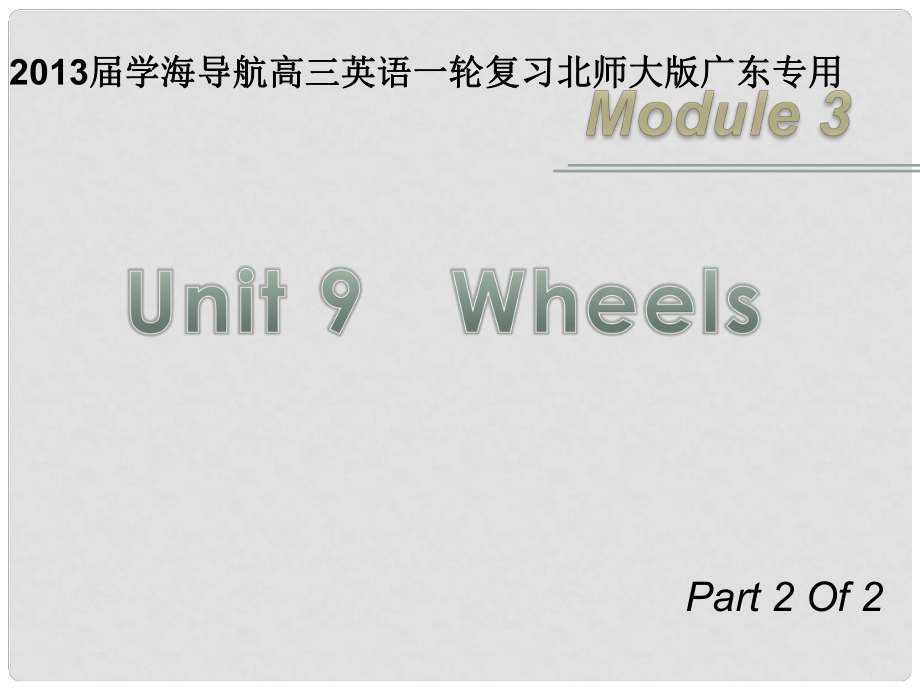《高三英語(yǔ)一輪復(fù)習(xí) M3 unit 9 Wheels(第2課時(shí))課件 北師大版(廣東專用)》由會(huì)員分享�,可在線閱讀,更多相關(guān)《高三英語(yǔ)一輪復(fù)習(xí) M3 unit 9 Wheels(第2課時(shí))課件 北師大版(廣東專用)(37頁(yè)珍藏版)》請(qǐng)?jiān)谘b配圖網(wǎng)上搜索�。
1�、Part 2 Of 22013屆學(xué)海導(dǎo)航高三英語(yǔ)一輪復(fù)習(xí)北師大版廣東專用屆學(xué)海導(dǎo)航高三英語(yǔ)一輪復(fù)習(xí)北師大版廣東專用9. compare compare作“比較”解時(shí),常用作及物動(dòng)詞,與介 詞with或to搭配,指同類事物的具體比較�。 Compare this with that, and you will see which is better. 把這個(gè)和那個(gè)比較一下,你就可以看出哪個(gè)比 較好了。compare作“比作”解時(shí),與介詞to搭配,是非同類事物的抽象比較�。Shakespeare compared the world to a stage.莎士比亞把人生比作舞臺(tái)。表示比較,可以用com
2�、pare with或compare to,但表示比喻,只能用compare to。過(guò)去分詞短語(yǔ)compared to或compared with表示“與比起來(lái)”,常在句中作狀語(yǔ),可位于句首或句尾,介詞to和with可通用�。It was a small place when compared to/with what it is now.和現(xiàn)在比起來(lái),那時(shí)它還是一個(gè)小地方。10. 有關(guān)pull的短語(yǔ)pull up (使)停住pull out 從車站開出,離站pull in 到站,進(jìn)站pull through 恢復(fù)健康pull down 拆毀We were still on the platfor
3�、m when the train pulled out.當(dāng)火車離站時(shí),我們?nèi)栽谡九_(tái)上。He was badly injured when falling off a horse but he will pull through.從馬上掉下來(lái)后,他嚴(yán)重受傷,但會(huì)恢復(fù)的�。That building on the corner was very old. They pulled it down and put up a modern bank.角落的那棟樓太舊了,他們把它拆毀,建成一棟現(xiàn)代化銀行。1. 從羅馬來(lái)的快車準(zhǔn)時(shí)進(jìn)站了�。 The express from Rome _ on time.2.
4、司機(jī)遇到交通燈時(shí)將車停下來(lái)�。 The driver _ when he came to the traffic lights.pulled inpulled up11. meanvt. say sth. in different words 意思是,意味著 What do you mean by saying so? 你這么說(shuō)是什么意思? What does this word mean? =What is meant by this word? 這個(gè)詞做什么解釋�? What he said meant hiring more workers. 他的意思是再雇一些工人。I didnt mean
5�、 to hurt you. 我本無(wú)意要傷害你。mean作第一個(gè)意思解時(shí),后面的非謂語(yǔ)動(dòng)詞用動(dòng)名詞,作第二個(gè)意思解時(shí),后面的動(dòng)詞用不定式�。 adj. 粗陋的,破爛不堪的;吝惜的,自私的 a mean house in a mean street 破爛街道上的簡(jiǎn)陋房屋 Her husband is rather mean over money matters. 她的丈夫?qū)﹀X財(cái)相當(dāng)吝惜。 You dont mean to say so. 你不是這個(gè)意思吧�。1. Why didnt you tell Anna the truth? I _(我本來(lái)打算). But I was lacking in th
6、e courage.2. You _(應(yīng)該) attend your sisters wedding. Why didnt you come?meant to havewere meant to12. agree v. 同意agree to (do) sth. 同意/答應(yīng)做某事agree with 與意見一致;與符合; 適宜于的健康或體質(zhì)agree on 就取得一致意見I asked him to help me and he agreed.我請(qǐng)他幫忙,他答應(yīng)了�。They agreed to our study plan at once.他們立即同意了我們的學(xué)習(xí)計(jì)劃。I do not agre
7�、e with what you have said.我不同意你所說(shuō)的。They all agree on the matter.他們?cè)谶@個(gè)問(wèn)題上意見一致�。1. 瑪麗的父親已同意她嫁給約翰。 Marys father has _ her marrying John.2. 這賬單與你原來(lái)的估計(jì)不符合�。 This bill does not _ your original estimate.3. 他們商定了合同的條件。 They _ the terms of the contract.agreed toagree withagreed on / upon13. go up 上升�;攀登 I belie
8、ve prices might go up next week. 我想下周的價(jià)格也許會(huì)上漲�。 go up to 上升到 go up by 上升了1. 河水在上漲/溫度在上升。The river / temperature _.2. 他們爬上了山/爬上了樹�。They _ the mountain/trees.【答案】1. is going up2. went up14. get stuck in 被困于 I was late because I got/was stuck in the traffic jam. 因?yàn)槿囄疫t到了。 “get+過(guò)去分詞”的常見短語(yǔ):get married結(jié)婚 ge
9�、t hurt受傷get scolded受責(zé)備 get excited激動(dòng)get cheated受騙 get started開始get bored厭煩 get paid被付get confused被弄糊涂 get dismissed被開除get beaten挨打 get killed被殺get caught in陷入;卷入�;偶然遇上(雨,交通堵塞等)When I asked Jenny Trowe of Greenpeace for advice about how to give up, she told me six things.當(dāng)我問(wèn)珍妮托爾關(guān)于綠色和平怎樣放棄時(shí)�,她告訴我6件事情。本句
10�、中,疑問(wèn)詞how+動(dòng)詞不定式to give up作介詞about的賓語(yǔ)。此外,“疑問(wèn)詞+動(dòng)詞不定式”還可作及物動(dòng)詞的賓語(yǔ)�、句子的主語(yǔ)和表語(yǔ)等。I dont know what to do next.(賓)我不知道下一步該做什么�。When to start hasnt been decided.(主)什么時(shí)候出發(fā)還沒(méi)有決定。My problem is where to stay tonight.(表)我的問(wèn)題是今晚在哪里過(guò)夜�。Please give me some advice on how to learn English.(賓)請(qǐng)給我一些關(guān)于如何學(xué)英語(yǔ)的建議。1. 你能教我怎樣用電腦嗎�? _
11、2. 我不知道是否該給他回信�。 _ _Can you teach me how to use the computer?I dont know whether to answer his letter(or not).如何使用高級(jí)詞匯及如何使句式多樣化如何使用高級(jí)詞匯及如何使句式多樣化 高考英語(yǔ)寫作部分在語(yǔ)言方面的要求中有:能盡量使用較高級(jí)詞匯。英文寫作中若有高級(jí)詞匯�,是獲取高分的重要條件之一,但如何使用高級(jí)詞匯�? 1注意使用詞組、習(xí)語(yǔ)來(lái)代替一些單詞以增加文采�。如:用catch sight of代替see,用care nothing for代替dislike等�。 2使用一些很有“洋味”的單詞。
12�、 Thank you for sharing the time with us. (用share而不用spend) The noise nearly drove me mad. (用drive而不用 make) Tom had his leg broken last week. (用have his leg broken而不用break his leg) 3避免重復(fù)使用同一單詞或短語(yǔ)。如:用We have built a new classroom building besides the oldone and we have also set up a library where the o
13�、ld one used to be. 比用We have built a new classroom building besides the old one and we have also built a library where the old one used to be. 好。 英文寫作中�,不同的思想內(nèi)容要用不同的句式來(lái)表達(dá);而同一思想內(nèi)容也可以用不同的句式來(lái)表達(dá)�。句式不同,表達(dá)效果也就不同�。只有句式多樣化,文章才會(huì)生動(dòng)有趣�,充滿活力。 可是,在實(shí)際寫作中�,初學(xué)寫作的學(xué)生往往一篇文章都是千篇一律的簡(jiǎn)單句,文章單調(diào)乏味�,毫無(wú)生氣。筆者認(rèn)為�,恰當(dāng)?shù)厥褂媚承┓椒ɑ蚴侄斡兄趯?shí)際表達(dá)形式的
14、多樣化�,增強(qiáng)表達(dá)效果。下面將常用方法簡(jiǎn)單介紹如下: 1改變句子的開頭方式�。不要一味地都是主語(yǔ)開頭, 可以把狀語(yǔ)置于句首等�。如: (原) He was still absorbed in his work deep into the night. (改) Deep into the night, he was absorbed in his work. 2學(xué)會(huì)運(yùn)用特殊句式。 省略句: If necessary, we shall send a telegram home. 倒裝句: Not only did he refuse the gift, he also severely critici
15�、zed the sender. 強(qiáng)調(diào)句: It was at that moment that he changed his mind. 3學(xué)會(huì)使用復(fù)合句、分詞狀語(yǔ)�、感嘆句、with的復(fù)合結(jié)構(gòu)�、獨(dú)立主格、it句型等多種句式�。如: (原)Yesterday my father went to Tianhe Mall. He bought us a lot of gifts. (改)Yesterday my father went to Tianhe Mall where he bought us a lot of gifts. (原)There was nothing else to do. W
16、e went home. (改)There being nothing else to do, we went home. 英語(yǔ)的句式是多種多樣的�,只要從要表達(dá)的內(nèi)容出發(fā)合理選用,文章的句式就會(huì)富于變化�。在學(xué)習(xí)寫作的過(guò)程中,學(xué)生應(yīng)不斷練習(xí)構(gòu)造各種各樣的句式�,以提高語(yǔ)言表達(dá)能力�。按要求改寫下列句子1. The singer came out of the airport. A lot of fans followed him. He had a bunch of flowers in his hand. (1)簡(jiǎn)單句:_(2)并列句:_ Followed by a lot of fans, th
17�、e singer came out of the airport, with a bunch of flowers in his hand. The singer came out of the airport, with a bunch of flowers in his hand, and a lot of fans followed him. (3)復(fù)合句:_ The singer who was followed by a lot of fans came out of the airport, with a bunch of flowers in his hand. 2.My unc
18、le lives in a small town. In the town there is a big factory. He has worked there for sixteen years. (1)用it改寫上組句子:_ (2)用復(fù)合句和并列句改寫:_ My uncle lives in a small town. In it there is a big factory. He has worked there for sixteen years. In the small town where my uncle lives, there is a big factory, and he has worked there for sixteen years.(3)用復(fù)合句和簡(jiǎn)單句改寫:_(4)用復(fù)合句改寫:_ My uncle lives in a small town, where there is a big factory. He has worked there for sixteen years. My uncle has worked for sixteen years in a big factory in the small town where he lives.
 高三英語(yǔ)一輪復(fù)習(xí) M3 unit 9 Wheels(第2課時(shí))課件 北師大版(廣東專用)
高三英語(yǔ)一輪復(fù)習(xí) M3 unit 9 Wheels(第2課時(shí))課件 北師大版(廣東專用)

